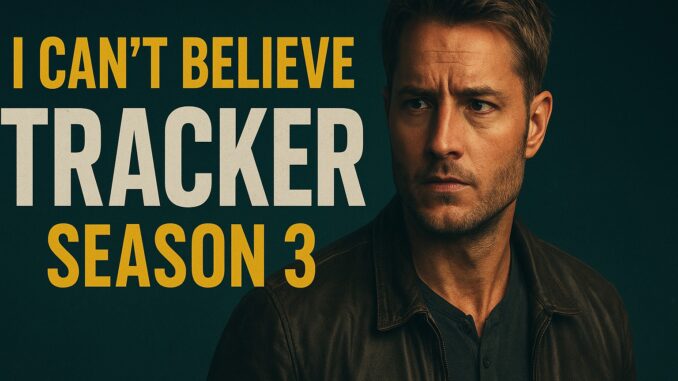
The Tracker Season 3 premiere didn’t just return with its usual mix of suspense and emotional drama—it pulled off something no one saw coming. Fans are buzzing, critics are impressed, and the internet can’t stop talking about how this one risky move just changed the game for the entire series. Let’s break down exactly what happened, why it worked, and how Tracker just redefined what it means to take a creative risk on TV.
What Made the Tracker Season 3 Premiere So Risky?
Season 3 of Tracker opened with a daring narrative shift that left fans holding their breath. Instead of starting with Colter Shaw (played by Justin Hartley) chasing down a new case, the show flipped the script completely.
For the first time, the audience saw Colter as the target—not the tracker. This reversal instantly raised the stakes and transformed the familiar formula into something unpredictable and thrilling.
A Gamble That Could’ve Gone Wrong
Let’s be real—fans of long-running shows don’t always love big changes. When a formula works, breaking it can backfire spectacularly. Think about how The Walking Dead or Lost struggled after risky creative pivots.
But Tracker’s showrunners clearly knew what they were doing. By putting Colter on the run and turning the hunter into the hunted, they injected fresh energy into the story while staying true to what fans love most: tension, mystery, and emotional payoff.
Colter Shaw Like You’ve Never Seen Him Before
One of the biggest reasons this gamble worked? Character development.
Colter isn’t the stoic lone wolf we met in Season 1. The premiere peeled back his layers, revealing vulnerability, guilt, and a haunted past that’s catching up with him.
Justin Hartley delivered one of his most nuanced performances yet—balancing grit with emotional rawness. Fans praised his acting online, calling it “award-worthy” and “his best episode so far.”
The Power of Reinvention in Long-Running Shows
In TV, reinvention is survival. Audiences crave evolution, not repetition.
Tracker’s creative team clearly understood that risk is the heart of longevity. Instead of recycling the same case-of-the-week formula, they gave viewers something unexpected—a storyline that blends Bourne Identity-style espionage with Yellowstone-level character drama.
Why Fans Can’t Stop Talking About It
Twitter, Reddit, and fan forums exploded after the episode aired.
Here are just a few reactions that show how much impact the risk had:
-
“This is the best premiere since Season 1. Totally didn’t expect that twist!”
-
“Turning Colter into the hunted? Genius move.”
-
“If the rest of Season 3 is like this, we’re in for a ride.”
When a fandom collectively agrees something is fire, you know the writers struck gold.
Breaking Down the Episode’s Biggest Twist
Without dropping too many spoilers, here’s the short version: Colter’s latest tracking job puts him in direct conflict with someone from his past—someone who knows him too well.
That person turns the tables, framing Colter and forcing him to survive on his instincts alone. Suddenly, every skill he’s used to catch others becomes his only hope of escape.
It’s poetic, it’s tense, and it’s brilliant storytelling.
The Emotional Core Behind the Action
What separates Tracker from your average action drama is heart.
This premiere wasn’t just about adrenaline—it was about accountability. Colter’s choices have consequences, and this episode made him face them in a raw, human way. Viewers finally saw the emotional cost of being a loner, always on the move and never truly safe.
A Cinematic Upgrade
Fans also noticed something else: the look of the episode.
The cinematography was sharper, the locations more cinematic, and the score richer. It felt less like a TV procedural and more like a high-budget streaming thriller.
The showrunner even teased in interviews that Season 3 would “feel like a movie every week,” and they weren’t kidding.
How the Writers Pulled It Off
The secret sauce? Careful buildup.
Season 2 laid subtle breadcrumbs about Colter’s mysterious past, unresolved trauma, and enemies in the shadows. The premiere cashed in on that setup masterfully, rewarding long-time fans with answers while keeping new viewers hooked.
It’s the kind of storytelling balance few shows manage this well.
Justin Hartley’s Evolution as a Leading Man
If you’ve followed Justin Hartley since This Is Us, you know he’s a pro at balancing strength and vulnerability.
But Tracker Season 3 takes that duality to a whole new level. His performance in this episode is layered, dynamic, and deeply human—cementing his status as one of TV’s most compelling leads.
What This Means for the Rest of the Season
Here’s the exciting part: if this premiere is any indication, Tracker is about to go deeper than ever before.
Expect more serialized storytelling, more emotional payoffs, and maybe even some shocking betrayals. The writers have clearly set up a season-long arc that will test Colter’s limits—physically, mentally, and morally.
The Balance Between Familiarity and Innovation
Why did this risk succeed where others fail? Because Tracker didn’t abandon its roots—it evolved them.
The core remains: justice, redemption, and survival. But the context shifted just enough to keep things fresh without alienating fans.
It’s a masterclass in how to innovate within your own formula.
Social Media’s Role in the Hype
Let’s not forget the digital buzz factor. Clips from the premiere trended on TikTok within hours. Fans made edits, reaction videos, and theory threads that racked up thousands of likes.
That online virality helped Tracker reach new audiences who might not have watched before. It’s proof that risk + buzz = success in today’s entertainment landscape.
Critics Are Applauding the Move
Even TV critics—who are notoriously tough to please—gave the premiere glowing reviews. Many praised its bold structure, emotional depth, and the decision to challenge its main character.
Some even called it “the most daring episode yet” and a sign that Tracker has matured into prestige television territory.

The Takeaway: Risk Pays When It’s Rooted in Storytelling
The lesson from Tracker Season 3’s premiere is simple but powerful:
Audiences reward authenticity and courage.
The writers didn’t change things just to shock viewers—they did it to serve the story. And that’s why it worked. It’s not just risk for risk’s sake—it’s evolution with purpose.
Conclusion: The Hunt Just Got Personal
Tracker Season 3’s premiere proves one thing—sometimes, the only way to move forward is to flip everything upside down.
By making Colter Shaw the hunted instead of the hunter, the show found new emotional territory and revitalized its own formula. It’s bold, it’s brilliant, and it’s exactly what great television should do: surprise you when you least expect it.
So yeah—this time, the risk didn’t just pay off. It redefined the game.